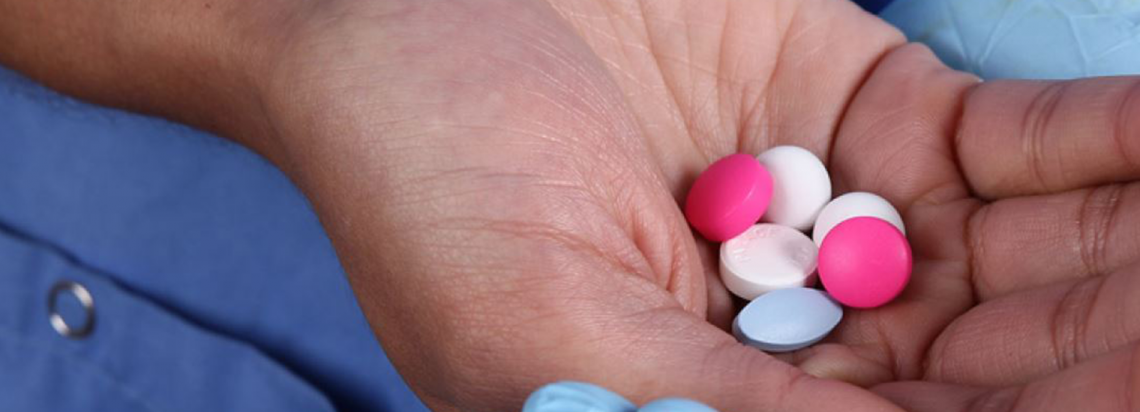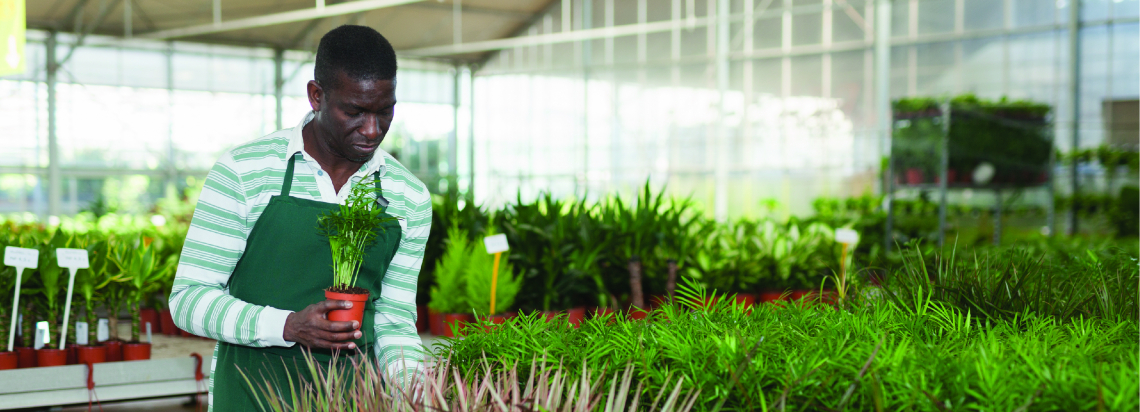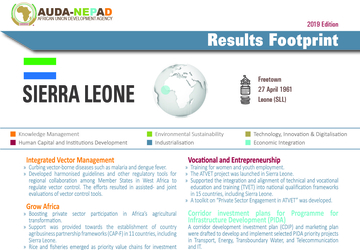 Sierra Leone
Sierra Leone
Official Name: Republic of Sierra Leone
Capital: Freetown
Independence Day: 27 April 1961
Currency: Leone (SLL)
Key Result
Support was provided to the Ministry of Education, Science & Technology towards enrollment of 500 women and girls in 30 Non-Formal Educational Centers across the country to receive numeracy, business development, literacy skills training and access start-up capital for their SMEs.
The MEST (Ministry of Education, Science and Technology - Non-Formal Education Directorate) enhanced the capacity of 500 women and girls who were enrolled at 30 Non-Formal Education (NFE) learning centres in eight districts of Sierra Leone, by providing literacy, livelihood skills training, business skills training, micro-enterprise support and reproductive health training.
Sierra Leone is expected to benefit from the West Africa Power Transmission Corridor is 2,000 km line along the coast connecting with the existing Ghana– Nigeria line with a capacity of 1,000 MW.
Sierra Leone received USD 50 million from the Global Agriculture and Food Security Programme (GAFSP) to support agricultural productivity growth through technology adoption and water management.
Related
Projects

A critical AU Model Law aimed at harmonizing medical products regulatory systems in Africa was endorsed by African Heads of State and Government at the January 2016 AU Summit in Addis Ababa, Ethiopia. The AU Model Law will contribute towards accelerate the regulation of safe, quality and affordable medical products and technologies in Sierra Leone.
The West Africa Medicines Regulatory Harmonization (MRH) programme was launched in 2015 in Accra, Ghana. Sierra Leone participated in the establishment of the joint MRH Project Steering Committee and formation of 7 Technical Working Groups (TWG’s). The TWG’s are tasked with developing technical guidelines of the MRH programme. In addition, a joint framework of collaboration between WAHO and WAEMU has been agreed upon.

CAADP Compact: Sierra Leone signed the CAADP Compact on 17–18 September 2009.
Capacity Building: NEPAD supported Sierra Leone in conducting an Independent Technical Review (ITR) from 4-9 June 2010.
Business: On 14 - 17 June 2010, the NEPAD Agency facilitated Sierra Leone’s first CAADP Business Meeting. Sierra Leone also received support in conducting Agriculture Joint Sector Reviews and capacity assessments were undertaken.
Funding: The country received funding from the Global Agriculture and Food Security Programme (GAFSP), a multilateral mechanism by the G20 to address funding of country and regional agriculture, amounting to USD 50.5 million.

Project : TAH programme
Description : This is phase I of the continental connectivity programme that focuses on completion and standardisation of the TAH missing links by 2030
Project : Single African Sky phase 1 (design and initial implementation)
Description : Single African Sky is a continental programme that will create a high-level, satellite-based air navigation system for the African continent
Project : Yamoussoukro Decision implementation
Description : Accelerate Yamoussoukro Decision implementation by identifying countries that are ready to fully implement it, and discussing and agreeing with both their governments and airlines to launch the voluntary club on a full membership basis;
Project : ICT Enabling Environment
Description : This programme would improve the environment for the private sectors to invest in high-speed broadband infrastructure
Project : ICT Terrestrial for Connectivity
Description : This programme has two main components: secure each country connection by at least two broadband infrastructure and ensure the access to submarine cable to all landlocked countries
Project : Internet Exchange Point (IXP) programme
Description : The aim of this programme is to provide Africa with adequate internet node exchange to maximise internal traffic
Project : West Africa Power Transmission Corridor
Description : 2,000 km line along the coast connecting with the existing Ghana– Nigeria line with a capacity of 1,000 MW
Project : Praia-Dakar-Abidjan Multimodal Corridor
Description : This programme would improve marine transport and the connection between island and mainland countries by creating a new maritime service between regional ports and facilitating this with a modern information system that links the maritime service with ports and road corridor in the Dakar-Abidjan Corridor. This programme would also modernize one of the most heavily travelled ARTIN corridor in West Africa (trade facilitation, OSBPs, capacity enhancement possibly through PPP)
Results:
•359 291 women capacitated through CSO and grassroots organizations including 92 Local authorities and state government in the six geopolitical zone of Nigeria. Namibia 13 Council has implemented Action Plan for Gender Aware Service Delivery and 384 Parliamentarian in the region of Tigray, Amhara and Somalia facilitated research support from 250 graduated students for Gender Aware Parliamentarian Oversight.
•74 435 women empowered economic and financial terms: Income generation skills; Deployment of technical assistance to boost agriculture production for both consumption and commercial purposes; Accessing agricultural extension services; Promotion of gender inclusiveness in decision making; Creation of enabling environment to access land; Land tenure and legalization of land title for women; Youth job creation; SME management; Informal and Regional Trade development.
•25 438 women support through institutional based capacity building.
•74 435 women empowered economic and financial terms: Income generation skills; Deployment of technical assistance to boost agriculture production for both consumption and commercial purposes; Accessing agricultural extension services; Promotion of gender inclusiveness in decision making; Creation of enabling environment to access land; Land tenure and legalization of land title for women; Youth job creation; SME management; Informal and Regional Trade development.
•25 438 women support through institutional based capacity building.

Results (2013 – 2015)
Advocacy and Strengthening of Negotiation Capacities on Post-2015 Development Agenda through the Common African Position (CAP):
• The multi-stakeholder framework of engagement specifically enhanced dialogue towards ensuring the required mass to influence the Post-2015 Global Agenda and Development Goals relevant to the Continent;
• This intervention helped strengthen country and regional level negotiating capacities for the effective incorporation and articulation of Africa’s priorities as enshrined in CAP in the final Global SDGs;
• The project enabled the participation of African stakeholders at the Means of Implementation Engagement, 3rd Financing for Development Conference and the UN General Assembly that adopted the new SDGs. This ensured the incorporation of Africa’s development priorities into the new goals through developing essential negotiation capacities;
• Through the CAP/SDGs space on the Africa Platform for Development Effectiveness (APDev), knowledge products and negotiation documents, as well as, policy briefs where successfully disseminated to the African negotiators in New York and kept the continent’s stakeholders informed of the overall process;
• Development and dissemination of post-2015 Policy Briefs on “Financing and Partnerships” and “Structural Economic Transformation and Inclusive Growth”. These are priorities outlined in the CAP and the policy briefs where utilized in the negotiation process for the African continent.
Global Partnership for Effective Development Cooperation (GPEDC):
• Africa secured the hosting of the 2nd High Level Meeting (HLM) of the Global Partnership. This was attained through robust negotiation and facilitating a common voice from Africa with regards to this critical engagement by the NEPAD Agency. The 2nd HLM will be held in Nairobi Kenya;
• The NEPAD Agency advocated for the full inclusion and participation of Africa’s Regional Economic Communities (RECs) in conducting the 2nd GP Monitoring Exercise. This was a fundamental achievement considering the RECs are the continent’s building blocks with regards to socio-economic transformation;
• The Africa Action Plan on Development Effectiveness (AAP) was granted the status of an official Global Partnership Initiative (GPI) at the Planning Meeting in Brussels. The AAP was developed by the NEPAD Agency in consultation with African multi stakeholders. This has enabled the Agency to successfully mobilize resources towards the implementation of the AAP.

Description : The use of political gravitas and goodwill to unblock and facilitate political bottlenecks affecting the implementation of ICT broadband and optic fibre projects on the continent



Description : 2,000 km line along the coast connecting with the existing Ghana– Nigeria line with a capacity of 1,000 MW
At the beginning of 2014, 37 of the 42 opted-in African countries have completed a rapid assessment / gap analysis. The next step for countries is to develop a SE4LL Action Agenda and Investment Prospectus(es). To support this process, the SE4ALL Africa Hub partners have led the development of Africa Guidelines for SE4ALL national Action Agendas. The Africa Guidelines lay out principles and process for developing Action Agendas and put forward a balanced approach of centralized and decentralized solutions to achieve universal access to energy services.
Progress in Sierra Leone:
The Gambia,
Sierra Leone and Burkina Faso are seeking technical validation of their Action Agendas, while
the remaining West African countries are actively developing their Action Agendas, the majority of
which are expected to be fnalised"
you agree to the AUDA-NEPAD Privacy Policy.


